Gustavo Viani, Professor of Radiation Oncology at Ribeirão Preto Medical School, University of Sao Paulo, shared a post on X:
“Radiation Oncology Colleagues: Are you staying updated on the rapidly evolving perioperative strategies for resectable esophageal and gastroesophageal junction (GEJ) adenocarcinoma?
New data from pivotal trials (MAGIC, CROSS, Neo-AEGIS, ESOPEC) are reshaping how we approach these cases. From FLOT’s systemic impact to CROSS’s organ-preserving potential, the future of multidisciplinary care is here.
Dive into the thread below to explore the latest advancements, outcomes, and challenges. Let’s discuss how we can optimize care and outcomes for our patients.”
A New Era for Esophageal/GEJ Adenocarcinoma Perioperative strategies for resectable esophageal or gastroesophageal junction (GEJ) adenocarcinoma are evolving rapidly.
Key data from MAGIC, CROSS, Neo-AEGIS, and now ESOPEC trials are reshaping the standard of care. Here’s what you need to know.
The Foundation:
The phase 3 MAGIC trial (2006) showed survival benefits for perioperative chemotherapy (ECF: epirubicin, cisplatin, 5-FU) + surgery in gastric/GEJ cancers. Meanwhile, the CROSS trial (2012) proved neoadjuvant chemoradiotherapy + surgery improves survival vs surgery alone.
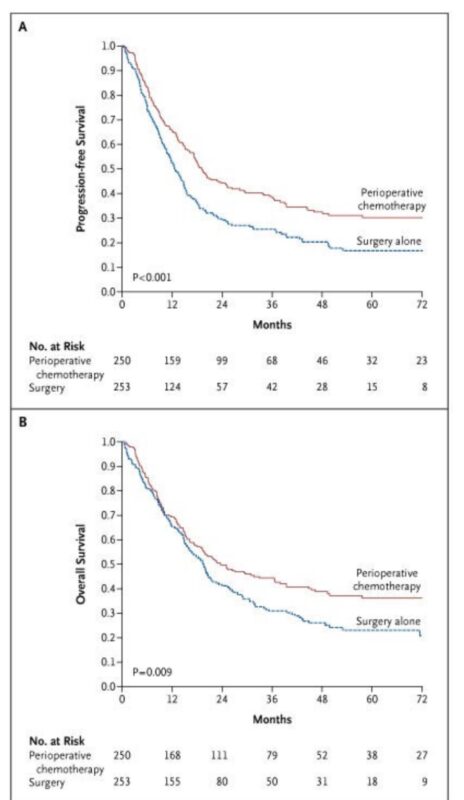
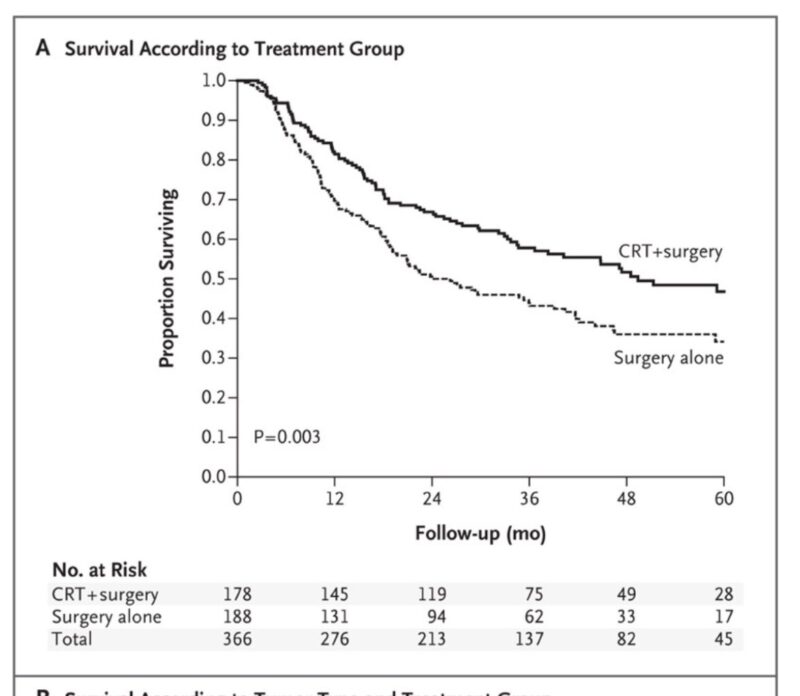
Key Question MAGIC vs CROSS: Which is superior?
With no direct comparison, both regimens were widely accepted. The Neo-AEGIS trial (2023) aimed to address this but was limited by early closure and low use of FLOT (only 14%). Neo Aegis.
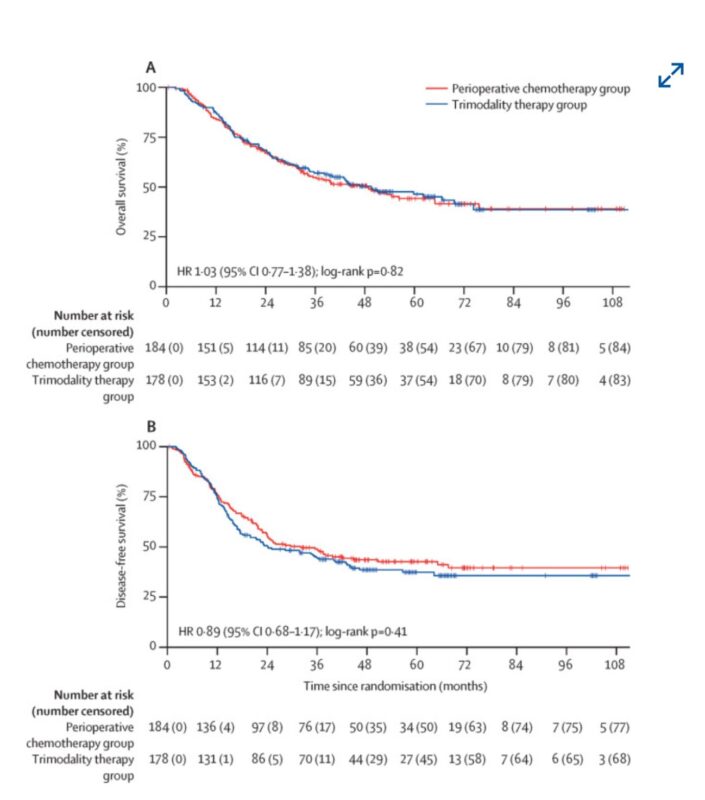
The FLOT Revolution:
The FLOT4-AIO trial (2019) set a new benchmark:
- FLOT (5-FU, leucovorin, oxaliplatin, docetaxel) showed median OS of 50 months vs 35 months with ECF in gastric/GEJ adenocarcinoma.
- FLOT quickly emerged as a superior option for perioperative chemotherapy. FLOAT -4.
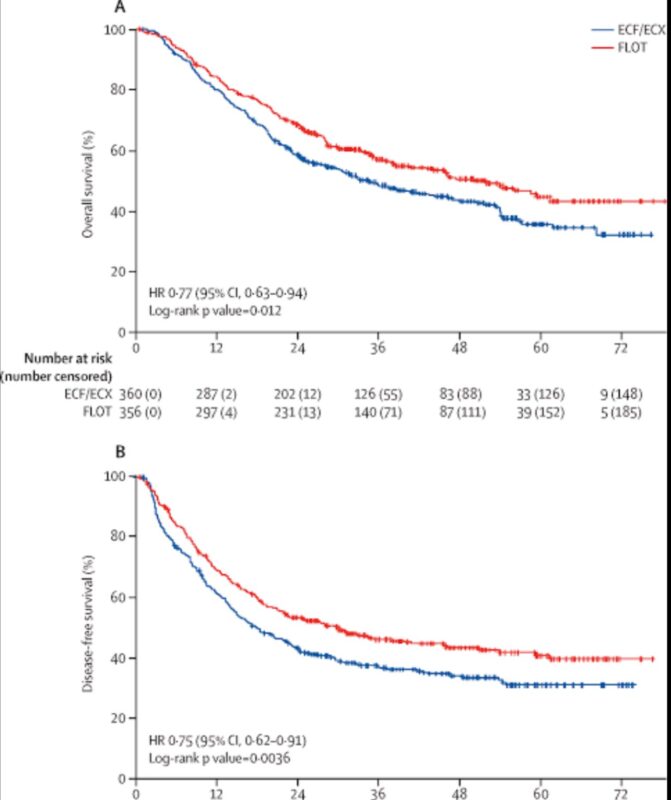
ESOPEC: The Game Changer The phase 3 ESOPEC trial (2024) directly compared perioperative FLOT vs neoadjuvant chemoradiotherapy (CROSS). Key findings:
- Median OS: 66 months (FLOT) vs 37 months (CROSS).
- 5-year OS: 57.4% (FLOT) vs 50.7% (CROSS).
- pCR: 19.3% (FLOT) vs 13.5% (CROSS) ESOPEC.
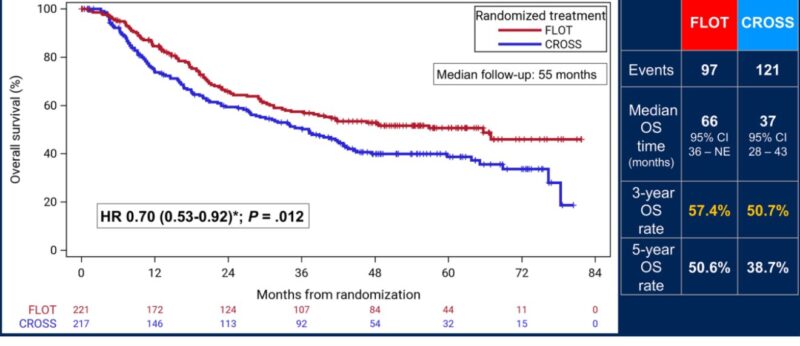
Micrometastases: The Missing Piece ESOPEC data suggest micrometastatic disease at resection drives recurrence. The systemic nature of FLOT might better address this compared to CROSS, explaining FLOT’s superior outcomes.
Caveats to Consider:
- CROSS arm in ESOPEC lacked adjuvant nivolumab for residual disease, a proven benefit per CheckMate-577 (DFS residual micromets?).
- Radiation dose (41.4 Gy) was lower than the North American standard (50.4 Gy), which could affect pCR rates.
- Treatment completion rates were higher with FLOT (87.3%) vs CROSS (67.7%). CHECKMATE 577.
Looking ahead perioperative FLOT is likely to become the standard for resectable esophageal/GEJ adenocarcinoma.
However, the unmet need remains high, with a 5-year OS of just 57.4%.
Future Directions:
- Trials like MATTERHORN (adding durvalumab to FLOT) could further enhance outcomes.
- Organ-preserving approaches with CROSS regimen remain crucial for medically inoperable patients or those opting out of surgery.
Conclusion:
The paradigm is shifting, but multidisciplinary care remains vital. FLOT stands as the likely standard for resectable cases, while innovations like immunotherapy and organ preservation hold promise for the future.
Gustavo Viani, MD is an Associate Professor in the Department of Medical Imaging, Hematology, and Oncology at Hospital das Clínicas, Faculty of Medicine of Ribeirão Preto, University of São Paulo (FMRP-USP). Dr. Viani’s research focuses on radiation oncology, with expertise in brachytherapy, stereotactic radiosurgery, dose fractionation, radiation tolerance, and overall oncology practices.
More posts featuring Gustavo Viani.


